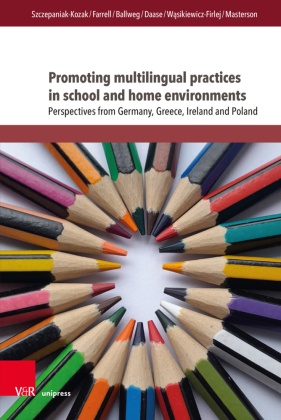
Promoting multilingual practices in school and home environments - Perspectives from Germany, Greece, Ireland and Poland
| Verlag | V&R unipress |
| Auflage | 2023 |
| Seiten | 293 |
| Format | 17,2 x 2,0 x 23,6 cm |
| Gewicht | 531 g |
| Reihe | Interdisziplinäre Verortungen der Angewandten Linguistik Band 008 |
| ISBN-10 | 3847115634 |
| ISBN-13 | 9783847115632 |
| Bestell-Nr | 84711563A |
The main aim of the book is to raise awareness of multilingualism in home and school environments and to offer a holistic view of the topic.
Holistic approaches to multilingualism and equity from the perspectives of four European countries
European society in the 21st century is characterised by increasing linguistic and cultural diversity and this offers valuable resources both on the economic and ideational level. At the same time, this growing diversity raises challenges to societies in terms of ensuring greater equity and social cohesion. In this book, the authors discuss the role of languages and multilingualism in the education system and at the interface of formal education and the home environment in this time of transition. They offer perspectives of four European countries, namely Germany, Greece, Ireland and Poland. By this, the authors aim to provide teacher educators, interested teachers and also other stakeholders in the education system with essential contextual information and related pedagogical considerations in the areas of language acquisition, multilingualism, multilingual upbringing, whole-school development and language-sensitive teaching.
Holistic approaches to multilingualism and equity from the perspectives of four European countries
European society in the 21st century is characterised by increasing linguistic and cultural diversity and this offers valuable resources both on the economic and ideational level. At the same time, this growing diversity raises challenges to societies in terms of ensuring greater equity and social cohesion. In this book, the authors discuss the role of languages and multilingualism in the education system and at the interface of formal education and the home environment in this time of transition. They offer perspectives of four European countries, namely Germany, Greece, Ireland and Poland. By this, the authors aim to provide teacher educators, interested teachers and also other stakeholders in the education system with essential contextual information and related pedagogical considerations in the areas of language acquisition, multilingualism, multilingual upbringing, whole-school development and language-sensitive teaching.
